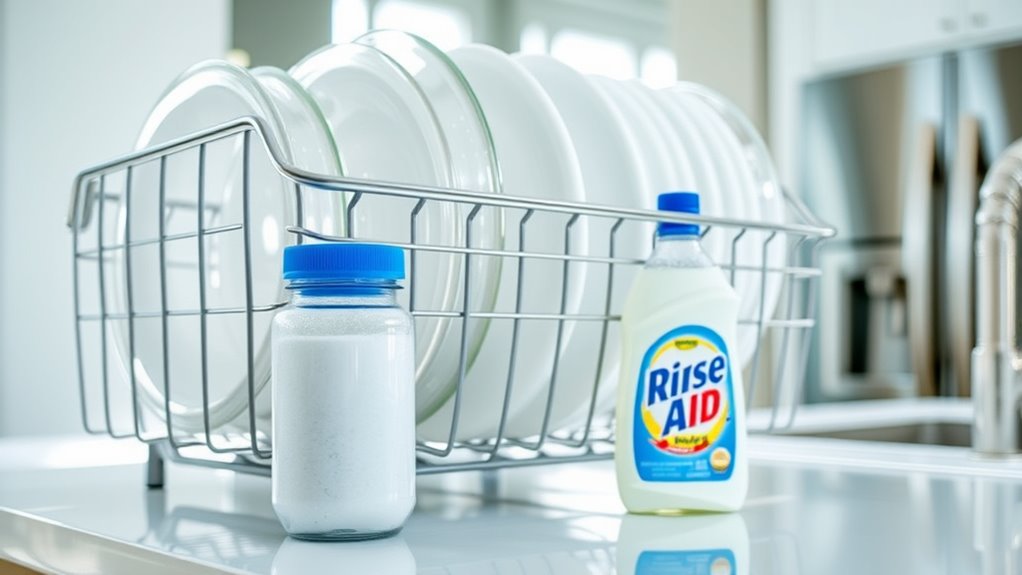Dishwasher salt and rinse aid serve different but essential roles in keeping your dishes spotless and protecting your appliance. Salt softens hard water, preventing mineral buildup and extending your dishwasher’s lifespan, while rinse aid reduces water spots and enhances drying. Many don’t realize their proper use and maintenance are key to peak performance, especially in areas with hard water. Keep supplies topped up and check for signs you need adjustments—there’s more to discover to get the best results.
Key Takeaways
- Dishwasher salt softens water and prevents limescale buildup, extending your machine’s lifespan and ensuring optimal cleaning.
- Rinse aid reduces water spots, improves drying, and enhances shine, working alongside detergent for streak-free dishes.
- Regularly refill salt and rinse aid as per manufacturer instructions to maintain dishwasher efficiency and prevent performance issues.
- Hard water requires more frequent salt use to prevent mineral deposits that can clog spray arms and reduce cleaning power.
- Signs like water spots, cloudy glassware, or poor cleaning indicate you should check and adjust salt and rinse aid levels.
The True Role of Dishwasher Salt and How It Protects Your Appliance
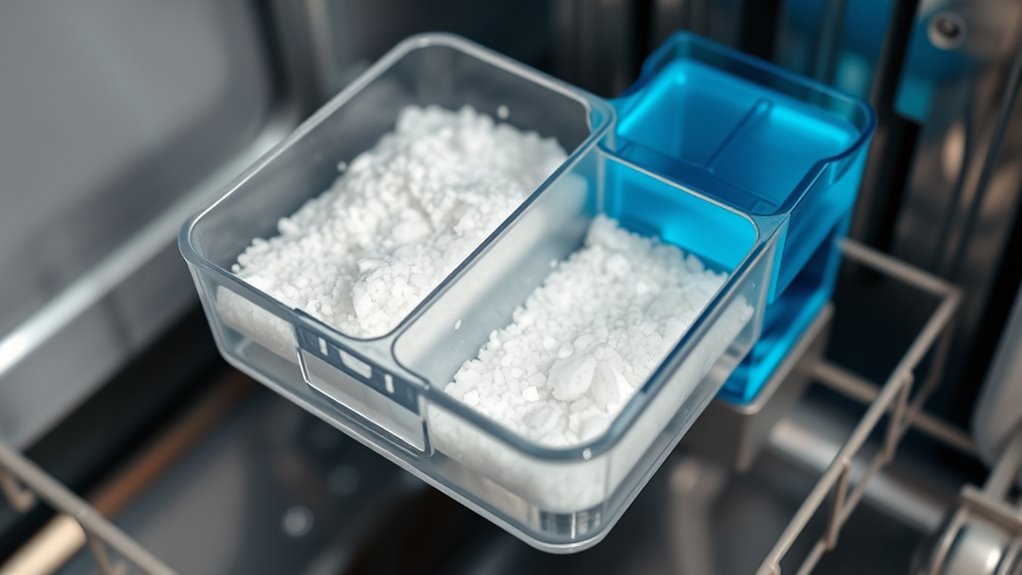
While many dishwashers have built-in water softeners, adding dishwasher salt is essential for maintaining their efficiency. The primary role of dishwasher salt is water softening, which prevents mineral buildup that can damage your appliance. Hard water causes limescale deposits that hinder dishwasher performance and reduce its lifespan. By regularly replenishing salt, you support proper dishwasher maintenance, ensuring your machine works smoothly and efficiently. Salt regenerates the water softening resin inside your dishwasher, keeping it effective at removing calcium and magnesium ions. This process protects internal components and improves cleaning results. Without sufficient salt, your dishwasher may struggle with hard water issues, leading to increased energy use and potential damage. Proper water softening is a key aspect of appliance longevity and safe operation. So, adding dishwasher salt isn’t just about shine; it’s about safeguarding your appliance over time.
Rinse Aid: More Than Just a Shine Booster
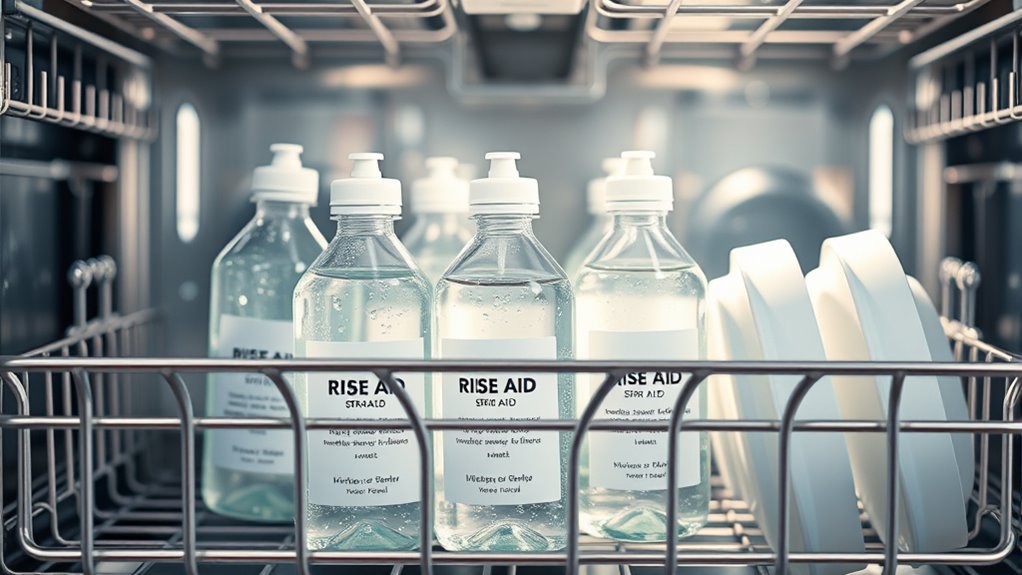
Rinse aid plays an essential role in achieving spotless, streak-free dishes, but its benefits go beyond just adding shine. It helps dishwasher detergents work more effectively by reducing water surface tension, ensuring water drains off surfaces smoothly. This results in fewer spots and streaks, making your dishes look cleaner. Additionally, using rinse aid can improve your dishwasher’s energy efficiency by reducing drying time, since less water remains on the dishes. Properly formulated rinse aids also help prevent mineral buildup inside the appliance, maintaining *ideal* performance over time. When you use rinse aid correctly, you’ll notice brighter, cleaner dishes with less effort, while also helping your dishwasher operate more efficiently and save energy. Understanding city dynamics is also important for maintaining your appliances effectively in different environments.
Common Myths About Dishwasher Salt Debunked
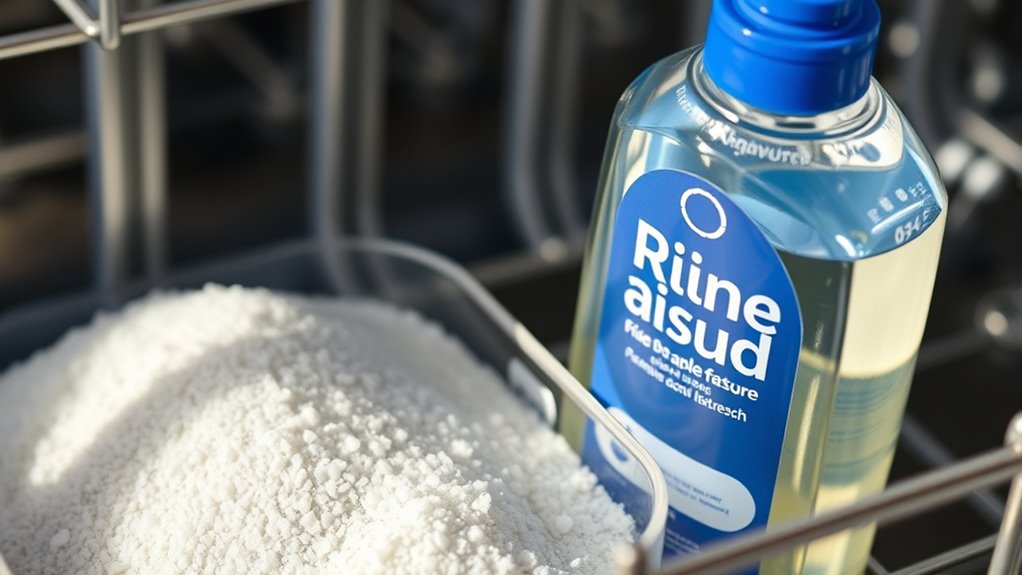
Many people believe dishwasher salt is unnecessary or only for heavily hard water areas, but these misconceptions can lead to improper use and potential damage. Dishwasher salt myths often suggest it’s optional, but in reality, it’s indispensable for softening water and preventing limescale buildup. Some think rinse aid misconceptions mean you don’t need both products, but they serve different purposes—salt softens water, while rinse aid prevents spots and improves drying. Believing salt is only for heavily hard water disregards the benefits of regular use, which extend the life of your dishwasher and improve cleaning results. Proper water softening is crucial for optimal performance and maintaining the longevity of your appliance. Clearing up these myths helps you understand that proper salt and rinse aid use is crucial for maintaining your appliance’s performance and ensuring spotless dishes.
How to Properly Refill and Maintain Salt and Rinse Aid Dispensers
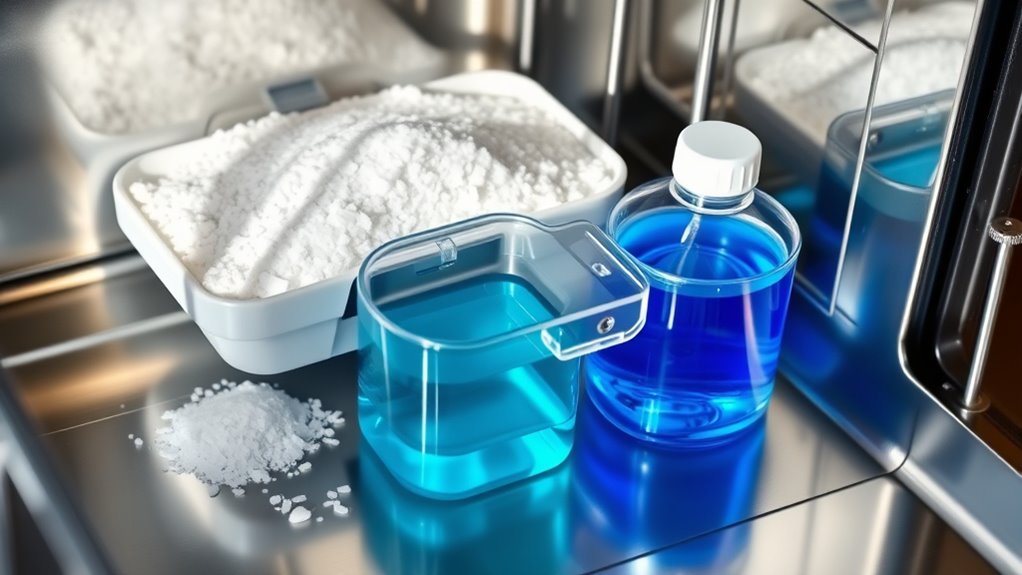
To guarantee your dishwasher performs at its best, it’s essential to regularly refill and maintain the salt and rinse aid dispensers. Before refilling, check that the salt is compatible with your appliance to avoid damage. Use the correct type of dishwasher salt, and fill the dispenser until it’s full but not over the edge. For rinse aid, pour in the recommended amount, ensuring it’s compatible with your dishwasher’s requirements. Regularly clean the dispensers to prevent buildup and clogs, which can interfere with proper dispensing. Always follow manufacturer instructions for both salt and rinse aid to avoid overfilling or underfilling. Proper maintenance ensures your dishwasher runs efficiently, prevents issues, and extends the lifespan of your appliances. Additionally, inspecting the dispenser mechanism periodically can help identify any malfunctions early and ensure consistent dispensing.
The Impact of Water Hardness on Your Dishwasher’s Performance

Hard water can cause mineral deposits to build up inside your dishwasher, reducing its efficiency over time. This buildup can lead to streaks and spots on your dishes, making cleaning less effective. Understanding how water hardness affects your machine helps you prevent damage and keep it running smoothly. Preppy dog names can also inspire a unique and stylish name for your dishwasher if you want to personalize it.
Hard Water Effects
When water contains high levels of minerals like calcium and magnesium, it can cause significant issues for your dishwasher’s performance. Hard water leads to mineral deposits and scale buildup that hinder cleaning and damage components over time. To combat this, water softening techniques are essential for maintaining efficiency and preventing costly repairs. Proper scale prevention guarantees your dishwasher runs smoothly and extends its lifespan. Regular use of specialized salt can help maintain the water’s softness and reduce mineral deposits in the long run.
Mineral Buildup Risks
Mineral buildup from hard water can considerably impair your dishwasher’s performance over time. When mineral deposits accumulate inside the appliance, they can clog spray nozzles, reduce water flow, and hinder proper cleaning. Water softening helps prevent these issues by reducing the minerals responsible for scale formation, especially calcium and magnesium. Without effective water softening, mineral deposits can form on internal components, leading to inefficiencies and potential damage. Regularly using dishwasher salt and rinse aid can help mitigate these risks by maintaining ideal water hardness levels. Keep an eye on mineral buildup, as it not only affects cleaning quality but also shortens your dishwasher’s lifespan. Addressing water hardness early with proper water softening techniques is essential to protect your appliance from long-term mineral buildup risks.
Cleaning Efficiency Decline
High water hardness can substantially reduce your dishwasher’s cleaning efficiency by causing mineral deposits to form on internal components. These deposits interfere with detergent compatibility, making it harder for cleaning agents to work effectively. As a result, you might notice longer cycle durations or dishes that aren’t thoroughly clean. Hard water can also cause soap scum buildup, which further hampers performance. To maintain ideal cleaning, consider using water softening methods or adjusting your cycle duration accordingly. Being aware of these factors helps ensure your dishwasher operates efficiently and your dishes come out spotless. Regular maintenance and appropriate detergent choices are key to preventing the negative effects of water hardness on your appliance. Additionally, choosing the right dishwasher salt and rinse aid can help mitigate mineral buildup and maintain optimal cleaning performance. Stay vigilant to keep your dishwasher running smoothly.
Choosing the Right Dishwasher Salt and Rinse Aid for Your Machine
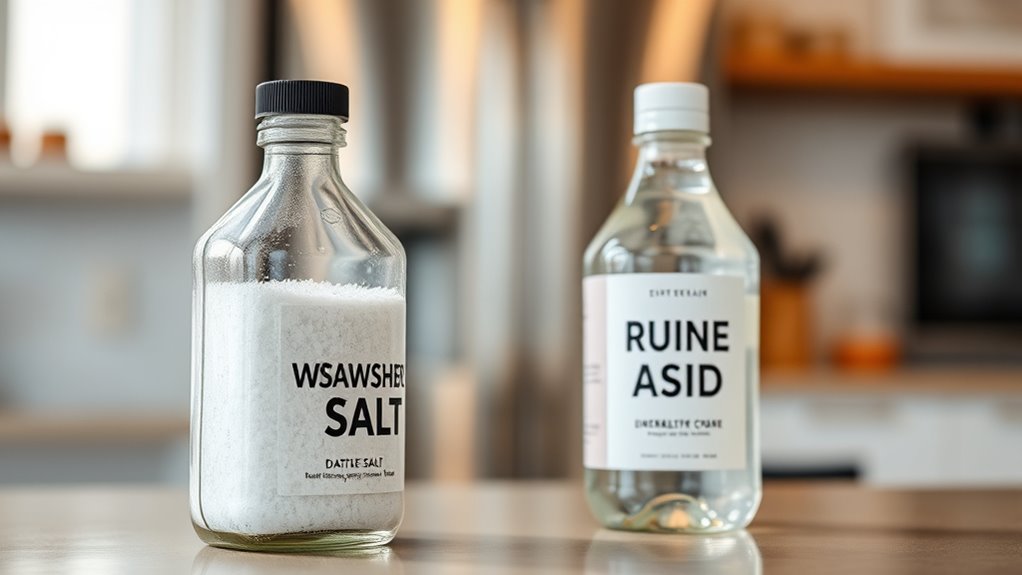
Choosing the right dishwasher salt and rinse aid can substantially improve your machine’s cleaning performance and prolong its lifespan. Start by checking your appliance’s user manual to identify recommended products, as using incompatible options can hinder machine maintenance. Opt for dishwasher detergents designed for your water hardness, and ensure the salt is suitable for your model’s softening system. Rinse aid choices should match your water type and cleaning needs, helping dishes dry streak-free. Avoid generic or low-quality products, which may cause buildup or damage over time. Regularly replacing these supplies with appropriate, high-quality options guarantees peak performance, reduces scale buildup, and keeps your dishwasher running smoothly. Proper selection is key to maintaining efficiency and extending your appliance’s life. Additionally, understanding the water hardness in your area can guide you in choosing the most effective salt and rinse aid for optimal results.
Tips to Maximize the Effectiveness of Salt and Rinse Aid
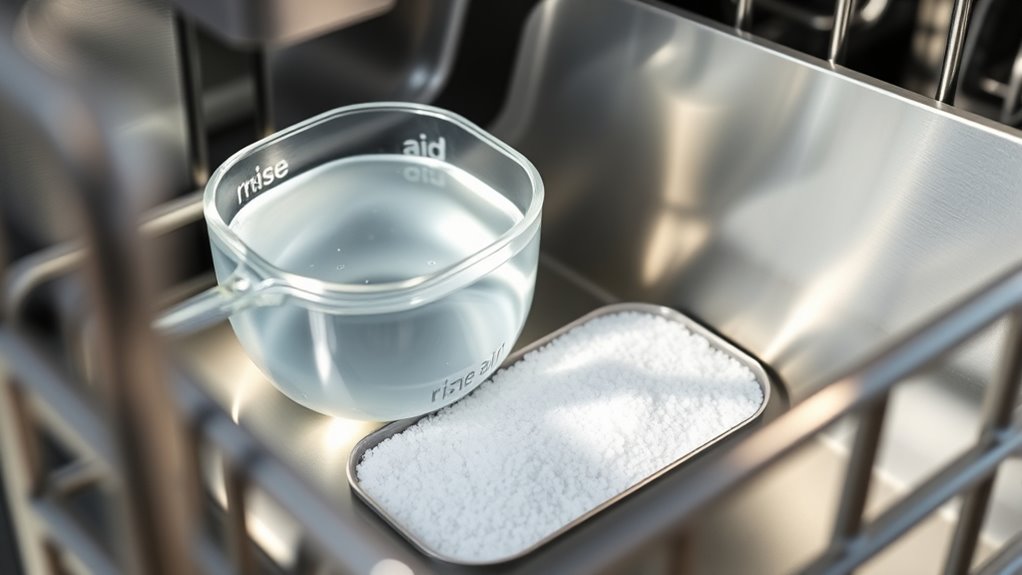
To get the most out of your dishwasher salt and rinse aid, it’s vital to use them correctly and consistently. Proper use helps maintain detergent effectiveness and maximizes cycle duration, guaranteeing spotless dishes. Regularly refill the salt to prevent hard water buildup, which can hinder cleaning performance. Use rinse aid in every cycle to improve drying and prevent water spots, especially on glassware. Also, avoid overloading the dishwasher, as overcrowding can block spray arms and reduce cleaning efficiency. Keep your dishwasher’s filters clean to guarantee ideal water flow and rinse aid distribution. When you follow these tips, your dishwasher works more efficiently, reducing cycle times and enhancing cleaning results. Additionally, choosing the right dishwasher detergents can further improve overall cleaning performance.
Signs That Indicate You Need to Adjust Your Salt and Rinse Aid Usage

If your dishes aren’t coming out spotless or you notice persistent water spots, it’s a clear sign you need to reassess your salt and rinse aid levels. Poor results may stem from detergent compatibility issues or improper rinse aid application. Additionally, if your cycle duration is too short or too long, cleaning effectiveness can suffer, indicating adjustments are needed. You might also see residue buildup or streaks, which suggest your rinse aid isn’t dispersing properly. Water spots on glassware and persistent cloudiness are other visual cues. Regularly check your salt and rinse aid levels, especially if you change detergents or modify cycle settings. Proper maintenance of your dishwasher’s supplies ensures optimal performance. Fine-tuning these supplies guarantees excellent cleaning and prevents issues caused by incompatible detergents or incorrect cycle durations.
Frequently Asked Questions
Can Using Too Much Salt Damage My Dishwasher?
Using too much salt can cause salt corrosion, which may damage your dishwasher’s parts over time. While salt improves dishwasher efficiency by softening water, overdoing it can lead to buildup and corrosion, reducing its lifespan. Always follow the manufacturer’s recommended salt amount to avoid these issues. Proper use guarantees your dishwasher runs smoothly, maintains ideal efficiency, and stays in good condition longer.
Is Rinse Aid Safe for All Types of Dishes?
Did you know that over 80% of dishwasher users worry about rinse aid safety? Rinse aid is safe for most dishes, but you should check your specific rinse aid brands for compatibility, especially with delicate or plastic items. It’s designed to improve drying and shine while minimizing spots. Just follow label instructions, and you won’t harm your dishes or increase your dishwasher energy use.
How Often Should I Refill Dishwasher Salt?
You should refill your dishwasher salt when the salt indicator light comes on or roughly every 4-6 weeks, depending on usage. Regular salt replenishment guarantees ideal spot-free rinsing and prevents limescale buildup, especially if you have hard water. Remember, salt is compatible with most dishwashers, but always check your model’s rinse aid compatibility. Keeping up with salt levels helps your dishwasher perform efficiently and prolongs its lifespan.
Do Different Water Types Require Specific Rinse Aids?
If you have hard water with high mineral content, you’ll want a specialized rinse aid to prevent spots and film. For example, someone with very hard water found that using a rinse aid formulated for high mineral content improved drying and shine. Different water types, like soft or hard, require specific rinse aids to optimize performance, prevent buildup, and make certain your dishes come out spotless.
Can I Use Regular Table Salt Instead of Dishwasher Salt?
You shouldn’t use regular table salt as a dishwasher salt substitute. Dishwasher salt is specially formulated to soften water and prevent limescale, unlike salt substitutes or table salt, which can damage your machine. Using alternatives like regular salt or salt substitutes may lead to clogs or corrosion. Stick to dishwasher salt designed for your appliance to guarantee it functions properly and lasts longer.
Conclusion
By understanding the true roles of dishwasher salt and rinse aid, you’re the captain steering your appliance through a sea of mineral build-up and stubborn stains. Keep your system well-stocked and maintained, and watch your dishes shine brighter than a lighthouse in a storm. With a little knowledge and care, you’ll turn your dishwasher into a trusty vessel sailing smoothly, leaving behind nothing but sparkling results on every voyage.

